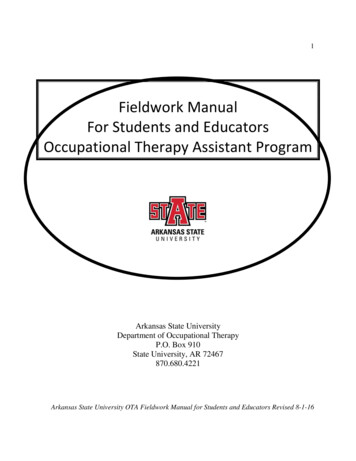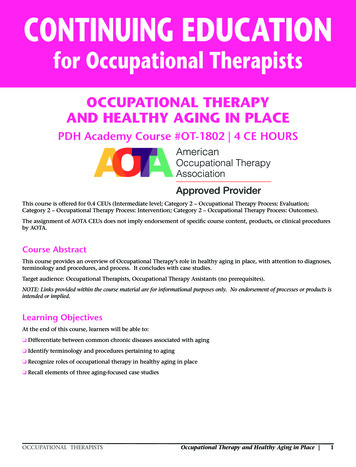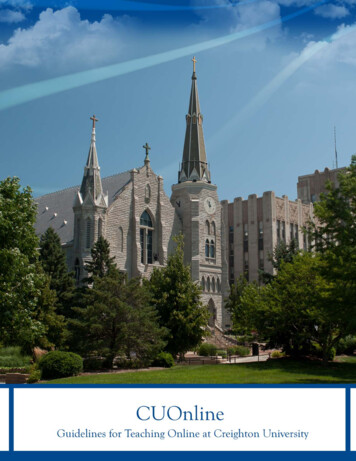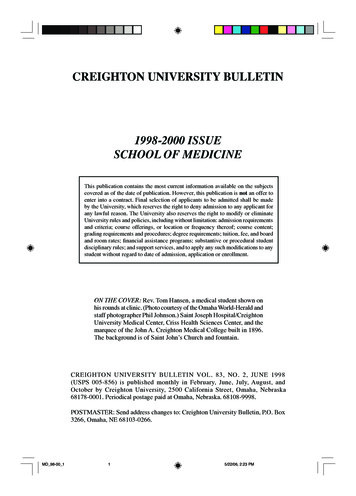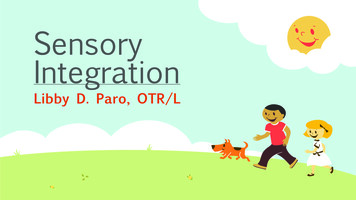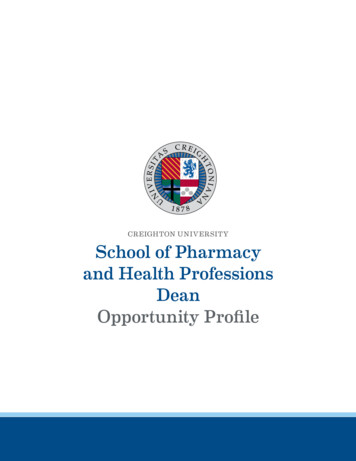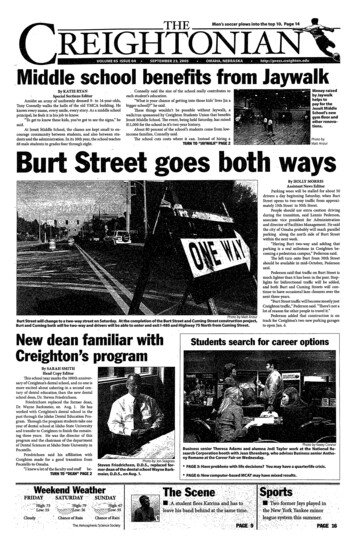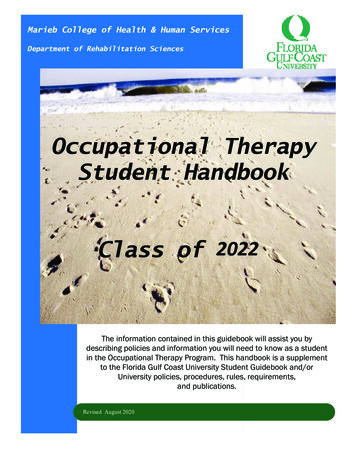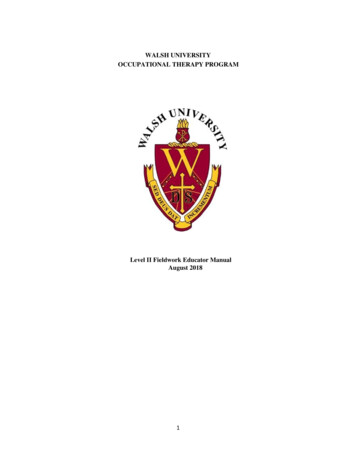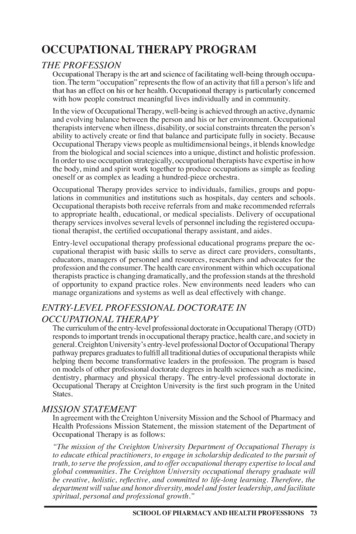
Transcription
OCCUPATIONAL THERAPY PROGRAMTHE PROFESSIONOccupational Therapy is the art and science of facilitating well-being through occupation. The term “occupation” represents the flow of an activity that fill a person’s life andthat has an effect on his or her health. Occupational therapy is particularly concernedwith how people construct meaningful lives individually and in community.In the view of Occupational Therapy, well-being is achieved through an active, dynamicand evolving balance between the person and his or her environment. Occupationaltherapists intervene when illness, disability, or social constraints threaten the person’sability to actively create or find that balance and participate fully in society. BecauseOccupational Therapy views people as multidimensional beings, it blends knowledgefrom the biological and social sciences into a unique, distinct and holistic profession.In order to use occupation strategically, occupational therapists have expertise in howthe body, mind and spirit work together to produce occupations as simple as feedingoneself or as complex as leading a hundred-piece orchestra.Occupational Therapy provides service to individuals, families, groups and populations in communities and institutions such as hospitals, day centers and schools.Occupational therapists both receive referrals from and make recommended referralsto appropriate health, educational, or medical specialists. Delivery of occupationaltherapy services involves several levels of personnel including the registered occupa tional therapist, the certified occupational therapy assistant, and aides.Entry-level occupational therapy professional educational programs prepare the oc cupational therapist with basic skills to serve as direct care providers, consultants,educators, managers of personnel and resources, researchers and advocates for theprofession and the consumer. The health care environment within which occupa tionaltherapists practice is changing dramatically, and the profession stands at the thresholdof opportunity to expand practice roles. New environments need leaders who canmanage organizations and systems as well as deal effectively with change.ENTRY-LEVEL PROFESSIONAL DOCTORATE INOCCUPATIONAL THERAPYThe curriculum of the entry-level professional doctorate in Occupational Therapy (OTD)responds to important trends in occupational therapy practice, health care, and society ingeneral. Creigh ton University’s entry-level professional Doctor of Occupational Therapypathway prepares graduates to fulfill all traditional duties of occupational therapists whilehelping them become transformative leaders in the profession. The program is basedon models of other professional doctorate degrees in health sciences such as medicine,den tistry, pharmacy and physical therapy. The entry-level professional doctorate inOccupational Therapy at Creighton University is the first such program in the UnitedStates.MISSION STATEMENTIn agreement with the Creighton University Mission and the School of Pharmacy andHealth Professions Mission Statement, the mission statement of the Department ofOccupational Therapy is as follows:“The mission of the Creighton University Department of Occupational Therapy isto educate ethical practitioners, to engage in scholarship dedicated to the pursuit oftruth, to serve the profession, and to offer occupational therapy expertise to local andglobal communities. The Creighton University occupational therapy graduate willbe creative, holistic, reflective, and committed to life-long learning. Therefore, thedepartment will value and honor diversity, model and foster leadership, and facilitatespiritual, personal and professional growth.”SCHOOL OF PHARMACY AND HEALTH PROFESSIONS73
PHILOSOPHYThe philosophical base of the Department of Occupational Therapy is consistent withthe Philosophical Base of Occupational Therapy (American Occupational TherapyAssociation-AOTA, 2006). The statement of philosophy of the Occupational TherapyDepartment states:“It is the philosophy of the Department that humans are self-directed, adaptive, occupational beings. As such, their development (emotional, spiritual, social, cognitive,and biological) occurs in the context of occupation. Learning comes about throughimmersed exploration of diverse practice environments, collaboration, service, reflection, and creative thinking. In the view of the Department, teaching is enabling,knowledge is understanding, and learning is the active construction of subject matter. We believe learning is contextual in three ways: new knowledge is acquired byextending and revising prior knowledge; new ideas acquire meaning when they arepresented in a coherent relationship to one another; and knowledge becomes usablewhen it is acquired in situations that entail applications to concrete problem-solving.Thus, the faculty teach through a variety of approaches intended to actively engagelearners, draw upon their power as emerging professionals, and integrate occupationaltherapy knowledge: discussion, reflection, and self-directed learning.”PROGRAM GOALS (STUDENT LEARNING OUTCOMES)The program goals of the clinical doctorate in Occupational Therapy program worktoward this end by preparing graduates that:1. Demonstrate entry-level occupational therapy clinical skills*2.Develop a new or refine an existing program that enhances occupational therapypractice.3. Demonstrate positive interpersonal skills and insight into one's professionalbehaviors to accurately appraise one's professional dispositions, strengths, andareas for improvement.4. Demonstrate the ability to practice educative roles for clients, peers, students,and others in community and clinical settings.5. Influence policy, practice, and education by advocating for occupational therapyservices for individuals and populations and for the profession.6. Demonstrate leadership aptitudes and characteristics to assume leadership rolesat the local, national and international levels in occupational therapy, healthprofessions, and the community.7. Develop essential knowledge and skills to contribute to the advancement ofoccupational therapy through scholarly activities.8. Apply principles and constructs of ethics to individual, institutional, and socialissues, articulate justifiable resolutions to these issues and act in an ethicalmanner.*Goal 1 is assumed to be accomplished by all post professional OTD students.74CREIGHTON UNIVERSITY BULLETIN
As part of a Jesuit University, we are convinced that the hope of humanity is inthe ability of men and women to seek the truths and values essential to human life.Therefore, we aim to lead our students and faculty in discovering and embracing thechallenging responsibilities of their intelligence, freedom, and value as persons. Webelieve that the intrinsic and unique value of human beings is expressed through occupation, and that the deepest purpose of each man and woman is to create, enrichand share life through human community. Further, we believe we should strive for ahuman community of justice, respect, and mutual concern. Occupations are activities having unique meaning and purpose in a person’s life. Occupations are centralto a person’s identity and competence, and they influence how one spends time andmakes decisions (AOTA, 2008). In this program, occupational therapy is viewed asa “profession concerned with promoting health and well being through occupation.The primary goal of occupational therapy is to enable people to participate in theactivities of everyday life” (World Federation of Occupational Therapists, 2005, p.3). Occupations unfold at the level of the individual, family, community, society andthe world.The profession-specific portion of the occupational therapy curriculum is conceptualized as encompassing three primary themes: occupation, professional practice, andprofessional identity. Rather than approach each theme sequentially, the curriculumis built around the nesting of these themes, so that students begin studying all of themas soon as they enter the program and continue to build on them throughout the curriculum. The content of each theme unfolds over the nine semester course sequence,becoming integrated as the student progresses. Course objectives reflect curriculumthemes, although some courses emphasize one theme more than others. In addition,a thread of Leadership derived from the theme of professional identity reinforces thedevelopment of doctorally prepared therapists committed to serve societal needs. Theleadership thread thus serves as a way to integrate the three themes of the curriculum.Students are expected to become engaged professionals who creatively articulate andmodel the integration of advanced knowledge and ethical decision-making throughinnovative practice, research, publication, advocacy, policy development and publicspeaking in efforts to influence broader health systems.References:American Occupational Therapy Association (2006). Association policies:The philosophical base of occupational therapy. American Journal ofOccupational Therapy, 60, 681-682.American Occupational Therapy Association, (2008). Occupational therapypractice framework: Domain and process, 2nd edition. American Journalof Occupational Therapy, 62, 609-639.World Federation of Occupational Therapists (2005) Definitions of OccupationalTherapy, Draft 7. Nacka, Sweden: WFOT Promotion and DevelopmentProgramme.PROGRAM ACCREDITATIONThe program in Occupational Therapy is accredited by the Accreditation Council forOccupational Therapy Education (ACOTE) of the American Occupational TherapyAssociation, Inc. (AOTA) located at 4720 Montgomery Lane, P.O. Box 31220,Bethesda, MD 20824-1220. The telephone number is (301) 652-AOTA.SCHOOL OF PHARMACY AND HEALTH PROFESSIONS75
ADMISSIONStudents enter the program in the fall semester. The preferred deadline for applications is December 1. The final deadline for applications is February 1. Interviews arerequired in the admission process. Qualified applicants will be notified if they areselected for an interview. Interviews will be scheduled in January and February.Enrollment is limited, and meeting minimum requirements does not guarantee admission to the professional program. Admission is based on academic and personalqualifications considered necessary for successful, competent practice as an occupational therapist. The OTD program does not require a minimum grade-point averagefor admission, although grade-point average is considered in the overall evaluationof the applicant’s suitability for the program. Candidates are evaluated on the basisof the fit between their personal goals and the mission and objectives of the OTDprogram. In addition, prior education, work experiences, honors, awards, service toothers, and leadership activities serve to provide insight into a candidate’s commitmentto lifelong learning and doctoral-level education. It is recommended that prospectivestudents spend time observing occupational therapists at work in their communities.This serves to familiarize the applicant with the general responsibilities of an occupational therapy professional.The Accreditation Council for Occupational Therapy Education (ACOTE) requiresthat by July 1, 2010, institutions with doctoral level education programs must requireapplicants for admission to hold a baccalaureate degree or higher prior to admissionto the program. For more information on program accreditation, please see AOTA/ACOTE website at ts must apply online at cationCreighton PreferenceThe Occupational Therapy Admission Committee has a strong preference for Creightonundergraduate students who complete the majority of their undergraduate courseworkat Creighton, including all prerequisites. All Creighton undergraduate students whohave achieved a minimum overall grade-point average (GPA) of 3.25 at the end ofthe semester in which the student applies will be guaranteed an interview.Guaranteed Admission PolicyCreighton students who began undergraduate studies prior to and including Fall 2007who meet the following criteria will be granted admission to the Doctor of Occupational Therapy program.Each student must:1. Be enrolled and complete all pre-occupational therapy requirements at CreightonUniversity prior to entry into the program.2. Submit a completed application to the Admission Office by December 1 of theacademic year prior to enrollment in the professional program.3. Remain in good academic and academic-related standing throughout allprerequisite coursework.4. Have achieved a minimum overall grade point average (GPA) of 3.25 at the endof the semester in which the student applies.5. Complete an interview expressing an appropriate rationale and demonstratinginterpersonal skills for the study and practice of occupational therapy.Students unable to meet one or more of the above criteria are encouraged to applyfor admission through the normal admission procedure.76CREIGHTON UNIVERSITY BULLETIN
PRE-PROFESSIONAL COMPONENT Beginning fall 2010, a baccalaureate degree has been required. Preoccupational therapy courses may be completed at any regionally accrediteduniversity or college. All prerequisite coursework must be completed with a grade of "C" orbetter.The courses listed below should be taken by pre-occupational therapy students. Thesecourses are reflective of a liberal education essential for occupational therapy professional practice. The pre-occupational therapy course sequence introduces students tothe various traditional liberal arts and empirical sciences which are later extended inthe OTD program. Together, the prerequisites and the OTD curriculum contribute toa broad understanding of human culture and prepare students to respond to the needsof society through professional practice.The School of Pharmacy and Health Professions will make the final determinationregarding courses satisfying requirements.All curricula in the SPAHP undergo constant review and refinement. Questions regarding prerequisites may be directed to the School of Pharmacy and Health ProfessionsAdmission Office, (402) 280-2662, (800) 325-2830, phaadmis@creighton.edu.Prerequisite CoursesSemesterQuarterHours HoursTheology, Philosophy and/or Ethics course(also includes religion or logic)34.5Culture, Ideas and/or Civilizations course(includes history, world religions, American studies,world literature, or women’s studies)34.5Anatomy (If enrolled in a combined anatomy/physiologycourse, 6 semester hours will be required.)34.5Psychology34.5English Composition(may be replaced with a hands-onfine or performing arts course)34.5Statistics3 4.5SCHOOL OF PHARMACY AND HEALTH PROFESSIONS77
TECHNICAL STANDARDSThe Doctor of Occupational Therapy education program in the School of Pharmacyand Health Professions at Creighton University prepares occupational therapists toserve as primary providers of occupational therapy care. In order to function as aclinical occupational therapist, an individual must be able to meet certain physical,emotional, intellectual and communication expectations for performance. Occupational therapy education requires the accumulation of scientific knowledge as wellas the simultaneous acquisition and demonstration of psychomotor skills, cognitiveskills and professional attitudes and behaviors. The faculty is committed to an educational environment where students may develop emotionally, spiritually, sociallyand cognitively.Technical standards must be met with or without reasonable accommodations consistent with the Americans with Disabilities Act (ADA). The School is committed toenabling students with disabilities to complete the course of study of the OTD Program by means of reasonable accommodations consistent with the ADA. Technicalstandards are necessary to create specific expectations for student performance in theclassroom, laboratory and clinical education environments. The purpose of technicalstandards is to delineate the psychomotor skills, cognitive skills and professionalattitudes and behaviors deemed essential for matriculation into, continuation in andcompletion of the educational program.I. Observation/ Sensory: Students must have sufficient visual abilities to be ableto observe and interpret patients/clients accurately. They should also possessfunctional tactile and proprioceptive skills and abilities necessary to perceive andsynthesize inputs during patient/client interaction, evaluation, and treatment.II. Communication: Students must demonstrate effective verbal and written communication with patients, family members/caregivers, faculty/staff, fieldworkpreceptors, payers, elected officials, members of the healthcare team and others.They must demonstrate appropriate communication with people of differentages and genders, with diverse physical, cognitive and emotional abilities, andfrom different cultural, ethnic, racial, socioeconomic, and religious backgroundsand lifestyles. Students must demonstrate the ability to use therapeutic communication and a client centered approach. They must display adequate Englishlanguage skills in written and oral communication.III. Motor: Students must display adequate motor skills to provide safe, efficient,and effective occupational therapy treatment. Examples of skills requiring motor ability include sitting tolerance, splint or assisted technology fabrication,computer usage, performing transfers and assisting with bed mobility, andproviding range of motion and strengthening activities. The motor abilitiesrequired include adequate gross and fine motor function, vestibular function,strength, and functional usage of the sensory system.IV. Intellectual / Conceptual: Students must demonstrate problem solving throughoutthe didactic and experiential components of the program. This includes the abilityto interpret information from multiple sources (written, verbal, environmental,interpersonal, etc.), carry out instructions in a timely manner, and understandand follow written instructions such as policies and procedures. Therefore, thestudent must be able to read complex material, and write in a way that is accurate, descriptive, free from errors and consistent with guidelines or standards.Further, students must be able to apply critical thinking processes in order to78CREIGHTON UNIVERSITY BULLETIN
gather information, identify problems and alternative plans of action. They mustbe able to make decisions spontaneously in "on the spot" situations, pressuresituations from high workload demands, and variable time and environmentaldemands.V. Behavioral/Social Skills /Professionalism: Students must possess sufficient emotional health to fully utilize their intellectual abilities, exercise good judgment,adhere to ethical standards, complete patient care responsibilities promptly, andrelate to others with courtesy, compassion, maturity, and respect for their dignity.Because occupational therapy education and practice takes place in a large variety of settings, students must have the ability to participate collaboratively asa (professional) team member, must be able to modify behavior in response tofeedback, and display emotional health when faced with changing environments,clinical uncertainties, and stressful workloads that include multiple concurrentdemands and short deadlines. This requires the ability of students to be aware ofand appropriately react to their own emotional responses. In addition, studentsmust at all times maintain personal appearance and hygiene that is appropriatefor professional and classroom settings.VI.Attainment of Technical Standards: Inability to comply with these technicalstandards may result in course failure. Applicants are encouraged to voluntarilydiscuss their disabilities with the Director of Admissions and the Assistant / Associate Dean for Academic Affairs of the School in order to consider and preparefor the accommodations that may be needed. After enrollment, a student witha disability who wishes to request reasonable accommodations may directlycontact the Assistant / Associate Dean for Academic Affairs of the School or theCreighton University Office of Services for Students with Disabilities. Verification and documentation of the disability by a qualified professional, such as aphysician or psychologist, will be needed before reasonable accommodationsare made. Accommodations will not be considered reasonable if they affect thesubstance of the occupational therapy educational program, compromise theSchool’s educational standards, and/or negatively affect the safety of studentsand/or other people, including patients, with whom they may come into contactin the course of their studies. If accommodations are provided, this informationwill be kept in strict confidence.All occupational therapy applicants must review the technical standards described inthis document and perform a self-evaluation to determine if they are able to maintaincompliance with them. A signed copy of this form should be returned to the SPAHPOffice of Admissions signifying the standards have been read and certifying compliance.Signing this document will serve as testimony that the student is in compliance withthese standards and understands the responsibilities it outlines. A student who isdismissed from the program and subsequently reinstated must re-sign this documentas testimony that the student is in compliance with these standards.SCHOOL OF PHARMACY AND HEALTH PROFESSIONS79
PROFESSIONAL COMPONENTEntry-level Doctor of Occupational Therapy PathwayThe entry-level professional doctorate curriculum in occupational therapy emphasizesthe development of critical thinking skills, an understanding of research literature,and professional competence. The degree Doctor of Occupational Therapy (OTD) isgranted to students who successfully complete a program consisting of the prerequisitecourse work and a baccalaureate degree followed by nine semesters of professionaleducation.In addition to didactic course work, students in the entry-level professional doctoratein Occupational Therapy pathway must register for Level I Fieldwork for four didacticsemesters of the curriculum beginning in the second semester. Level I Fieldwork isprovided in a variety of settings covering the lifespan, including hospitals, clinics,school systems and community centers. The schedule of didactic classes is organized in such a way to assist students in accomplishing this course requirement. Allfieldwork assignments are made by the Occupational Therapy Academic FieldworkCoordinators.Two of the nine professional semesters required for the awarding of the entry-levelOTD degree are three-month Level II Fieldwork placements at supervised, approvedfacilities. Eligibility for Level II Fieldwork experiences is determined by the student’smastery of the professional curriculum. In addition, a 16-week Professional Rotationexperience is required during the ninth (last) semester of the curriculum. A GPA of2.00 or higher is required for Level II Fieldwork placement.It is the student’s responsibility to finance transportation and living accommodationsfor all fieldwork and Professional Rotation courses. Students should plan to travel tosites outside of the local area for both Level I and Level II Fieldwork, as well as forProfessional Rotation.Entry-level Doctor of Occupational Therapy Pathway - Alaska ProgramIn 2007, we began our University of Alaska Anchorage (UAA)-Creighton University Distance Initiative. This entry-level program initiative includes asynchronousand synchronous teaching and learning in a unique distance hybrid model. Studentscomplete lab and experiential learning activities at the UAA campus.Students must be residents of Alaska and meet the admission requirement and criteriaidentical to the on-campus applicants. (see above for more information)Post-Professional Doctor of Occupational Therapy PathwayThe School initiated a post-professional Doctor of Occupational Therapy (OTD)pathway in the fall of 1995. This pathway is one of the first professional OT doctoralprograms of its kind in the country and is designed to strengthen occupational therapists’ professional, practice management, teaching, and administrative skills. Withthe expertise and credentials gained by completing this program, graduates are moreable to compete for positions in a diverse range of practice environments and will bepoised to lead the profession into the 21sst century. In 2001, the school instituted thepost-professional OTD program in a distance format to make the program readilyaccessible to occupational therapy practitioners who wish to pursue doctoral education while working. Students are able to access didactic coursework supportive ofoccupational therapy practice through course websites, print, videotape, CD-ROM,and web technology.80CREIGHTON UNIVERSITY BULLETIN
The post professional curriculum provides well-developed learning opportunitiesrelated to the practice of occupational therapy. In addition, the curriculum offerseducation in instructional and research methods in an effort to prepare students foracademic as well as practice-oriented careers. Didactic coursework addresses advancedtheory, knowledge, and skills in critical analysis, personnel supervision, examinationof health care policy, legal and ethical parameters of practice, and quality review methodologies. Various methodologies enhance the practice relevance of the coursework.The distance pathway, designed for practicing professionals, allows students to enrollin two or more courses per enrollment term. The introduction to clinical doctoralstudies course (POTD 500), and research proposal course (POTD 554) are held onCreighton University’s campus. Once students successfully complete POTD 500,they may begin to enroll in courses to complete their plan of study.After successful completion of POTD 580, students participate in 16 credit hours ofprofessional rotations. Rotations can be developed in a variety of practice settingsincluding pediatrics, industrial rehabilitation, hand rehabilitation, neonatal intensivecare, private practice, psychiatry, home health, gerontology, community, cross-culturalenvironments and academia. Students can develop rotations in the state where theyreside or where they workStudents accepted to the post-professional OTD pathway must have completed a bachelor’s or entry-level master’s degree in occupational therapy at an ACOTE accreditedinstitution and have successfully passed the certification examination. Students accepted into the distance post-professional OTD pathway must demonstrate that theyhave access to the necessary technology for the web curriculum.Applicants must apply online at cationREQUIREMENTS FOR GRADUATIONIn order to satisfy the requirements for graduation, the entry-level Doctor of Occupational Therapy and the post-professional Doctor of Occupational Therapy studentsmust success fully complete all requirements for admission, and all required coursesin their professional curriculum, and must participate in a capstone event at the endof the academic program. A cumulative grade-point average of not less than 2.00 isrequired for graduation based on all work attempted while enrolled in the profes sionalprogram. Candidates for the entry-level OTD and post-professional OTD degrees mustbe determined by the faculty to be of good moral character and fit for the practice ofthe profession, must have paid all indebtedness to the Univer sity, and must be presentat the ceremonies where the degree is conferred (unless excused under Universityrules). To participate in Commencement, a candidate must submit an application fordegree available online through the Registrar's Office by the University deadline. Inan effort to comply with accreditation and ongoing programmatic quality assurance,completion of all course evaluations and graduate exit survey is required in order forthe student to be assigned a course grade and/or graduate.SCHOOL OF PHARMACY AND HEALTH PROFESSIONS81
The program in Occupational Therapy is accredited by the Accreditation Council for Occupational Therapy Education (ACOTE) of the American Occupational Therapy Association, Inc. (AOTA) located at 4720 Montgomery Lane, P.O. Box 31220, Bethesda, MD 20824-1220. The telephone number is (301) 652-AOTA.

